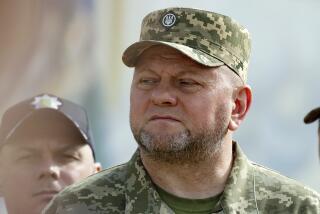Guns Fall Silent in Chechnya’s Capital
- Share via
MOSCOW — Russian and Chechen enemies stopped fighting at midday Friday in the breakaway region’s capital, obeying a cease-fire worked out between Russia’s shuttling security chief, Alexander I. Lebed, and the chief of staff of Chechen separatist forces, Aslan Maskhadov.
But it remained murky as to whether the Kremlin is ready to take the chance of peace in the intractable conflict in Chechnya that Lebed, against all odds, is offering.
In turbulent recent days, Lebed and the Chechens have agreed to a truce only to see it threatened by a conflicting order from the Russian command to launch an all-out assault on Grozny, the capital. With only hours to go, Lebed got the generals to drop their assault plan and accept the cease-fire.
But for most of Friday, the only reward Russian President Boris N. Yeltsin had to offer Lebed for his dramatic, unexpectedly successful diplomatic blitz was a snub--the second time in as many days Yeltsin had publicly slighted his protege.
Late in the evening, however, the Kremlin issued a statement saying Yeltsin had telephoned Lebed. The president “listened to Lebed’s report and in general approved of his first steps on the way toward a peaceful resolution of the Chechen conflict,” the Kremlin said. It said Yeltsin authorized Lebed to hold talks with Chechen rebel leaders and to sign a political accord that would keep Chechnya within the Russian Federation.
But this terse statement, the Associated Press noted, was issued just before midnight--when it could not attract questions or much attention to the politically ambitious Lebed.
*
For their part, Russia’s leading politicians are waiting to see if Lebed succeeds or fails to get the Chechens, who have fought for full independence, to accept the semiautonomous status Moscow now envisages for them. Until then, they are hedging their bets.
After meeting with Maskhadov in southern Chechnya, Lebed had flown back to Moscow expecting a briefing with Yeltsin. But Yeltsin did not see him; aides said no meeting was scheduled. And during the day, news reports were largely dismissive of Lebed--with independent NTV television, for example, saying that the retired general would be required to make a written report of his whirlwind peace process before gaining access to Yeltsin.
The first presidential slap had come Thursday. The president, whose failing health has been the subject of growing concern, made his first television appearance Thursday in weeks--only to say he was “not quite satisfied” with Lebed’s work on Chechnya.
The reception of Lebed’s achievements reveal a battle for influence in Moscow almost as deadly, politically speaking, as the fighting over the last 20 months in Chechnya. Many commentators believe that the demands of court politics are behind Yeltsin’s frosty treatment of Lebed, who has moved further and faster toward solving the Chechen conflict than any other Russian negotiator.
The 65-year-old Yeltsin’s usual political tactic is to carefully position potential rivals around him in the Kremlin--all warring for his favor and the chance of succeeding him--only to slap them down when they rise too far. Lebed had favors heaped on him after the election, becoming national security advisor, head of the Russian security council and presidential envoy to Chechnya. Success in Chechnya means he has overstepped the mark, won too much attention and upset the delicate Kremlin balance of power.
According to Izvestia newspaper, “Lebed is convinced that someone [in the Kremlin] is presenting his efforts to bring peace to Chechnya in a completely misleading way.”
*
Meantime, the peace plan began to move ahead. The Russian commander in Chechnya, Lt. Gen. Vyacheslav Tikhomirov, and Maskhadov agreed during talks Friday in the republic that federal troops and Chechen separatist forces should both be withdrawn from Grozny by Thursday. Joint patrols will be mustered at 3 p.m. today, Isa Umarov, the separatists’ information analyst, told Ekho Moskvy radio. He said the patrols will include 270 Russians and 270 Chechens, who will all swear to defend law and order in Grozny.
The aim, Maskhadov said, is “to prevent looting, provocations and sabotage in order that soldiers of Russian forces may return home alive and that Chechen civilians do not die.”
More to Read
Sign up for Essential California
The most important California stories and recommendations in your inbox every morning.
You may occasionally receive promotional content from the Los Angeles Times.










